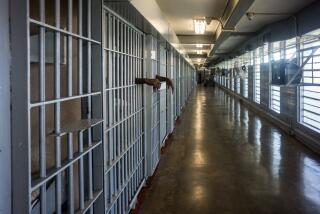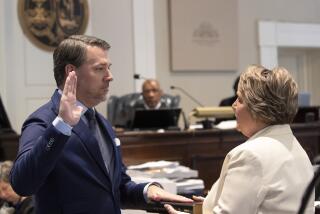Holdout Jurors Can Put Legal System to the Test
- Share via
Name calling. Fist waving. Yelling. Sound like a bar fight?
No -- just evidence of a jury stuck in dysfunctional deliberations. When one juror disagrees with the other 11, the closed-door discussion can break down into shouting matches and personal attacks on the lone holdout.
Holdouts have long been studied by lawyers and law professors, who are keenly aware that just one dissenting juror can lead to a mistrial. Attorneys frequently hire consultants to gauge prospective jurors’ personalities in an attempt to predict how they will evaluate cases. Judges watch out for potential jurors who may have personal biases or agendas. After mistrials, consultants question holdout jurors to learn more about them.
Courts are also struggling with the issue of holdout jurors. A federal appellate court recently ruled that a judge violated the constitutional rights of a defendant in a South Los Angeles murder case by removing a holdout juror during deliberations. The U.S. 9th Circuit Court of Appeals ruled that the defendant was entitled to a new trial, saying the juror was simply doing her job by independently assessing the evidence.
Another holdout got even more attention. A New York judge declared a mistrial in April in the grand-larceny case against two former Tyco International Ltd. executives, saying that there had been pressure placed on one of the jurors. The holdout juror, Ruth Jordan, reportedly received a threatening letter after her identity was revealed.
Although hung juries are uncommon and 11-1 deadlocks rare, lone holdouts often capture the attention of the public and the media. A stand-alone vote is seen by some as a miscarriage of justice and by others as evidence that the justice system is working exactly as it should.
Rarely does the lone holdout manage to sway his fellow jurors like Henry Fonda did in the motion picture “Twelve Angry Men.” Instead, the 12th juror often cracks from the overwhelming stress and changes sides, sometimes just so the trial will end.
“You really have to have chutzpah,” said Karen Fleming-Ginn, a jury consultant based in Northern California. “Imagine yourself in a room with 11 angry people. Holding your ground would be difficult.”
Holdouts who don’t give in often frustrate their fellow jurors and leave them feeling as though the system failed.
Take the Orange County case of Jeffrey West, charged with child endangerment after accidentally firing a shotgun at his 8-year-old daughter. He was sitting on the edge of the bathtub loading and unloading his shotgun when it accidentally discharged. The girl lost a kidney and part of her arm.
After a weeklong trial in October, the jurors deliberated for more than a day before splitting 11 to 1 in favor of acquittal. The holdout juror, who could not be reached, said at the time that he felt pressured by other jurors to change his mind but stuck with the law as he read it and voted his conscience. He said he believed West was guilty for taking a gun into the bathroom while the girl was there.
Juror Douglas Moore, who voted to acquit, said the jurors were more evenly split at the start of deliberations. Then they started going through the evidence and the law and more jurors concluded that West’s behavior did not rise to the level of a felony crime.
When it came down to everyone against the foreman, Moore said he and his fellow jurors took turns trying to convince the 12th juror, yelling at times. The once amicable deliberations quickly turned contentious. They couldn’t break the impasse.
They wrote a note saying that the lone holdout was uncooperative and irrational, but never submitted it to the judge. They thought they would be overstepping their bounds by doing so.
The district attorney’s office refiled the case and West is waiting to go to trial a second time.
*
Holdouts, however, see cases from entirely different perspectives.
One Michigan holdout said that being the only not-guilty vote in a murder solicitation case was traumatizing. Attorneys selected the 60-year-old psychologist to sit on a panel in the 2002 case against Eric John Keane, an inmate from Ferrysburg, Mich., charged with attempting to hire a hit man to kill his former girlfriend and her young daughter. The case ended in a mistrial with a vote of 11 to 1 for conviction.
“This has had a big impact on my life,” said the 12th juror, also the foreman, who asked to remain anonymous. “It never went away.”
The holdout, who is married and has two grown children, said he took his duty seriously. He took notes and listened closely to the evidence and the instructions during the two-day trial. Though the other jurors were respectful during the two days of deliberations, the holdout said he felt tremendous pressure to conform to their opinion.
He knew the rest of the panel was anxious and wanted to go home, as did he, but he said he could not in good conscience vote to convict. Prosecutors failed to convince him beyond a reasonable doubt that Keane had the intent to solicit the murders, he said.
“I felt a heavy burden to come up with a verdict,” he said. “I was willing to convict, but I wasn’t going to do that without having my questions answered.”
It was extremely difficult to disagree with his fellow jurors, he said. But in some ways, the situation got worse when the case ended in a mistrial. The local newspaper named him in a front-page article under the headline, “Holdout juror forces case to be tried again.” One of the other jurors wrote to the paper saying that the juror had no common sense. The prosecutor told the press that the juror had wasted taxpayers’ money.
The prosecutor “was badmouthing not just me, but the whole jury process,” said the holdout. “A hung jury was not an easy way out. There is no easy way.”
Prosecutor Tony Tague said in a recent interview he was surprised by the outcome. He called the evidence in the murder-for-hire case overwhelming. The inmate Keane solicited testified at the trial and prosecutors had Keane’s note and a map he had drawn of the house’s interior, Tague said.
Tague immediately refiled the case and a second jury convicted Keane after minutes of deliberations.
Even though jurors are required to decide cases based on the law and not their consciences, emotion, personal experience and occasionally bias play a role in deliberations and can lead to deadlocks.
Despite the publicity in high-profile mistrials, hung juries are not common. In a recent study of 372 state trials in four U.S. cities, only 7.5% of the juries deadlocked on all counts and 12.8% deadlocked on at least one charge. The study by the National Center for State Courts found that one of the primary reasons for deadlocks was bad interpersonal dynamics among the jurors.
In hung juries, it often comes down to one person.
Juror Lee Jarvis saw that firsthand when he sat on a high-profile Orange County death penalty case in 2002. The jurors agreed that the defendant, Maurice Steskal, was guilty of murder, but they disagreed on his punishment. Eleven jurors voted for life in prison without parole while one voted for death. Jarvis said he was convinced that Steskal was mentally ill and should not be executed. The 12th juror disagreed.
“It was pretty heated,” he said. “We tried like crazy to turn him around but it didn’t work ... He had his mind made up.”
Jarvis said was furious because he felt that justice wasn’t served. A second jury returned a verdict of death for Steskal.
Lone holdouts are usually self-confident people who don’t follow authority or conventions and who aren’t afraid to speak their mind, experts said. Attorneys or consultants look for nontraditional jurors based on appearances, professions or prior jury experience. They ask prospective jurors questions such as: If you expressed an opinion, could you change your mind if you were convinced it was wrong? In a group of people that you don’t know well, how influential are you?
Defense attorneys want jurors who will make up their own minds and won’t be bullied. Prosecutors, on the other hand, avoid jurors who seem antagonistic or rebellious. Los Angeles County Deputy Dist. Atty. Darrell Mavis said he wants jurors who can get along and are going to reach a consensus.
Judges say jurors are supposed to make 12 separate decisions, not one mob vote. They cannot kick a juror off just because that person disagrees, but can do so if he refuses to deliberate.
“We’re always looking for resolution,” Los Angeles Judge Tricia Ann Bigelow said. “But it has to be a fair and just resolution. If they [jurors] simply have a different view of the evidence, that is just the nature of the jury system.”
More to Read
Sign up for Essential California
The most important California stories and recommendations in your inbox every morning.
You may occasionally receive promotional content from the Los Angeles Times.










